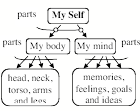However, we should not complain about that, because this is precisely the way it should be! For, most of our common psychology-words have this peculiar property:
It’s the same when you face a new kind of problem:
We switch how we think so fluently that we scarcely aware that we’re doing this—except when this leads to cascades so great that we notice a change in emotional state. One of the central goals of this book is to describe the variety of our mental resources, and how these might be organized—and the final chapters of this book will show that much of our human resourcefulness depends upon on having multiple ways to escape from getting stuck.
Why do we think that we have Selves?
We do not have any good evidence that young infants start out with any such sense—and we can’t trust our infantile memories. Then why do all of us come to believe that somewhere, deep in the heart of each mind, there exists some permanent entity that experiences all our feelings and thoughts? Here’s what I think might lead to this:
Perhaps the simplest and most common such model is composed of parts like these:

However, every normal person also builds many other kinds of self-models that try to describe how they think about such subjects as their social relationships, physical skills, political views, and economic, spiritual, and sexual attitudes. Chapter §9 will go on to suggest that what each person calls his or her ‘Self’ is a great network of such ‘mental models’—each of which attempts to describe only certain aspects of a person’s own mind.
Why have multiple models of Selves?
That probably would not be practical, because such a structure would be too large for us to ‘keep in mind’ all its details at once. This suggests that the limitations of our brains must constrain us, at each particular moment, to superimpose a few model-cartoons—each by itself too incomplete to answer most questions about yourself.
Besides, for each particular such kind of problem, some of those models will help more than others—by highlighting the most relevant features. This means both that you need to use multiple views, and that you need ways to rapidly switch among them. Let’s listen to Richard Feynman again:
The key word here is ‘guess’ because every such theory has virtues and faults; no single model or representation is best for every different purpose or goal—and each is likely to get you stuck in certain kinds of predicaments.
How do we develop new goals and ideas?
The next few chapters will take the commonsense view that everyone already knows what goals are, and focus instead on questions about how we come to acquire them. However, that discussion will be incomplete until we present (in Chapter §6) more detailed ideas about how goals work.
In the usual view of how human minds grow, each child begins with instinctive reactions, but then goes through stages of mental growth that overlay these with additional layers and levels of goals. Those older instincts may still remain, but these new resources gain increasing control—until we can think about our own motives and goals, and perhaps try to change or reformulate them.
But what possible basis could we use for learning to appraise ourselves? How could we choose which new goals to adopt—and how could we possibly justify them? No infant could ever be wise enough to make good such choices by itself. So the following chapter will argue that our brains must have evolved, instead, ways to copy the ideals and attitudes of our parents, friends, and acquaintances!
Part II. Attachments and goals
§2-1. Playing with Mud
“It’s not just learning things that’s important. It’s learning what to do with what you learn and learning why you learn things at all that matters.”
A child named Carol is playing with mud. Equipped with a fork, a spoon, and a cup, her goal is to bake a make-believe cake, the way she’s seen her mother do. Let’s assume that she is playing alone, and imagine three

